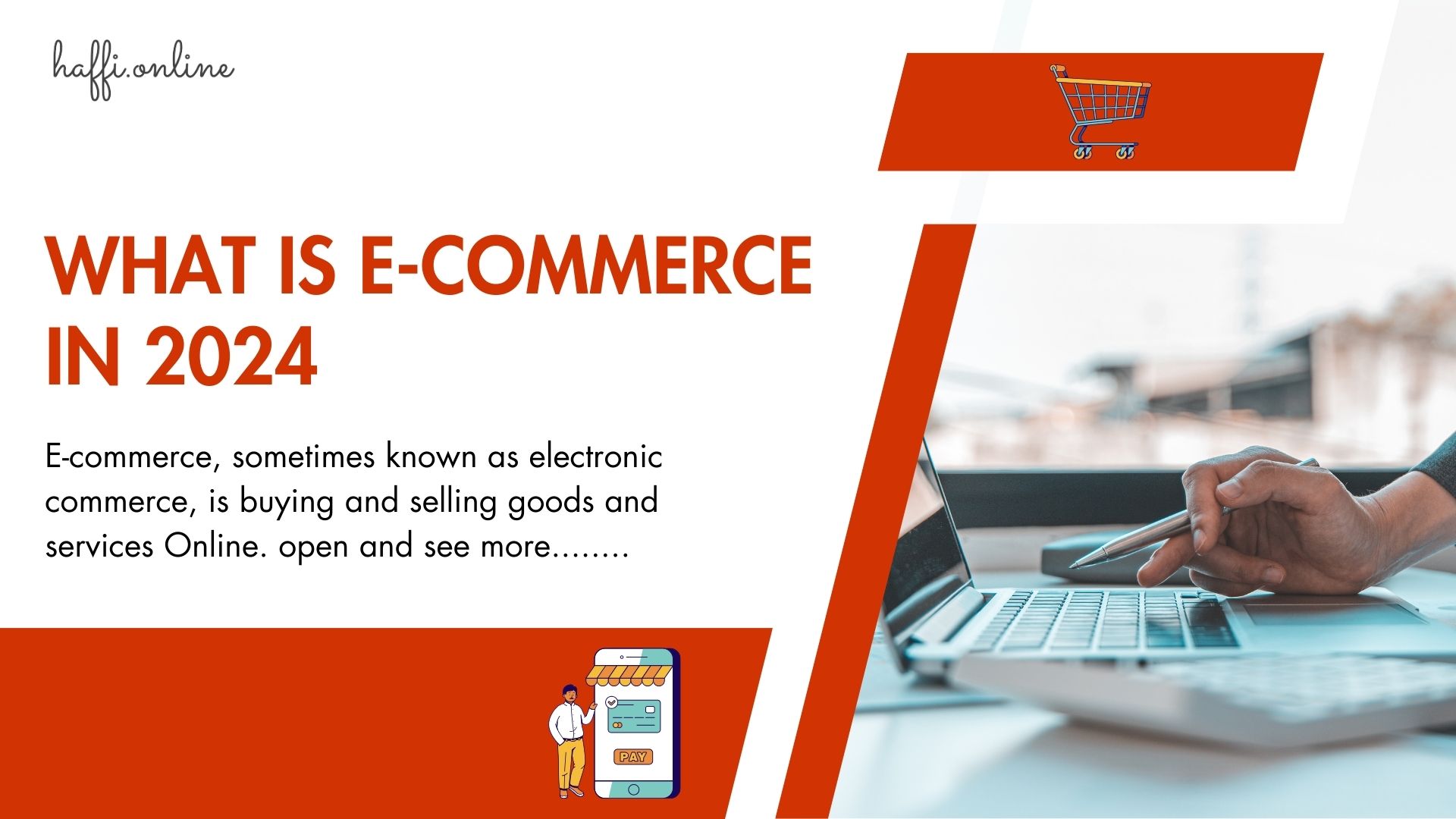
What is E-commerce in 2024?
E-commerce, sometimes known as electronic commerce, is buying and selling goods and services online. It includes exchanging goods or services between businesses and consumers, or between the two.
E-commerce businesses are made possible by platforms such as websites, mobile applications, or online marketplaces. The platform haffi.online is provided best and free website where you can read and learn about digital marketing and different skills
When e-commerce was first defined as a straightforward process (such as a consumer purchasing from an e-commerce website). The term has expanded as a result of advancements in technology. E-commerce is now sometimes referred to as internal company transactions or business-to-business commerce. It can also go on, for example:
- Online sales of multichannel individual retailers with traditional storefronts ·
- Sharing Economy platforms that enable the purchase of services like ridesharing ·
- Social Media sites like Facebook where followers engage in so-called social commerce
Thus, the e-commerce industry has grown and now includes relevant technologies that facilitate sales. Such as mobile payment platforms and secure data transmission technologies.
Defined E-Commerce
An Overview A lot of people define e-commerce as the online sale or purchase of physical products. However, the significance of e-commerce extends to the sale and purchase of non-physical goods as well. In general, when a business is sold online.
Some online retailers only sell their products online. For instance, a businessman starts a company that sells expensive pet products. In the days before the internet. They either sold their goods in small batches to major pet stores or sold them in their pet store.
These business owners now have a third option: e-commerce. You have the option to sell your products via your website, a third-party website, or both.
Sometimes, the lines separating traditional single-dealer retail and online commerce overlap. Classifying an experience as one or the other can be challenging when a customer compares stores using his smartphone. While looking through physical products in a brick-and-mortar store.
What are e-commerce channels?
An e-commerce channel is any digital space where a customer conducts business. Consider the following options when it comes to shopping or browsing the internet. In this way, you can search for articles on a company’s website, and download the app on your mobile device. Here are a few of the most well-liked e-commerce channels:
In brief, mobile commerce refers to the act of making purchases via a handheld device. Such as a tablet or smartphone. Businesses must meet the demands of exceptional mobile experiences as more and more followers choose to shop in this way. No matter what device a customer uses, they want it to be easy and intuitive to search for products, put them in the shopping cart, and make purchases.
Social Commerce: Social Commerce integrates the entire shopping experience into social media, from browsing to checking out. Followers can find products by browsing through your social feeds, searching through your brand-social posts to identify products that meet their needs, and then making purchases directly from shoppable content on a social platform.
Followers find social commerce to be a convenient way to search for and purchase products. Businesses can use it as a good way to quickly expand their customer base and reach.
E-commerce websites: An E-commerce website is a very effective sales tool that allows followers to browse, search, and purchase your products using desktop or mobile devices. These websites should include a homepage that accurately represents your brand, product pages that entice followers to buy, and a painless checkout process.
Why is e-commerce significant?
Ever since the first product was sold online in the 1990s, e-commerce has greatly changed the way businesses conduct cross-border transactions. The adoption of the practice of businesses conducting at least some of their operations online, such as posting offers on official websites or accepting payments via mobile payment processors, has shaped the modern economy. Furthermore, there has been an exponential increase in global e-commerce since the COVID-19 outbreak. The e-commerce sector has grown to $26.7 billion in US dollars as of 2021.
Over the past three decades, online retail in a browser-based e-commerce store has grown significantly beyond a small business. Businesses need comprehensively integrated e-commerce solutions with many of their business processes to compete and succeed in this vast ecosystem. This enables them to provide comprehensive customer experiences across several platforms and enable optimizations such as automation and conversational analytics.
Advantages and disadvantages of E-Commerce
E-commerce offers businesses a lot of Advantages, but it also has some potential disadvantages. Online businesses have the potential to enhance the customer experience because online shopping is convenient and easy. Furthermore, starting an e-commerce business is far easier than starting any other type of business because it has lower startup costs and a wealth of tools available to entrepreneurs.
Advantages of E-Commerce:
Low Startup and Operating Costs: Generally speaking, starting an online store is less expensive than opening a brick-and-mortar store because there are no startup costs associated with it and it can be done with fewer employees.
- Offers flexibility: Because it allows businesses and their followers to make purchases every day and from anywhere, e-commerce gives them that flexibility.
- The process of getting involved in data-driven marketing is straightforward: Your online store may provide you with a wealth of marketing data through analyses and reports, enabling you to better assist in promoting your business.
- Many products are available in a large selection: E-commerce offers a wider range of available products than brick-and-mortar stores, which can only hold so much inventory in their physical space.
Disadvantages of e-commerce:
- Lower customer connection: followers may feel less connected to your brand when they shop online because there is no one to contact with. Additionally, before purchasing the product, buyers will not be able to touch it to make sure it is exactly what they want.
- More coordination is needed for shipping logistics: Since e-commerce clients can be located anywhere in the world, business owners need to make sure their shipping and logistics can deliver goods on time. Additionally, followers will have to wait for their orders.
- Deficient customer support: A lot of online retailers don’t have a customer care agent on staff who can assist clients with inquiries and problems whenever they arise.
What are the benefits of the usage of e-commerce software?
E-commerce offers the utmost accessibility and convenience. It’s a highly effective way to sell goods and services, regardless of whether your company is entirely digital or you use it to augment your physical stores. However, the advantages of e-commerce go well beyond the ease of operating your business online. These benefits start as soon as you launch your online store: Cost savings: Physical stores have overhead, such as the cost of rent, staffing, and utilities. Additionally, physical locations have set business hours, meaning that you can only make sales during a certain portion of your followers’ waking hours. E-commerce, on the other hand, allows you to sell products and services whenever you want without these costs.
Transnational transactions: The operations of a physical store are restricted to a certain region. An ecommerce website can help your company reach a wider worldwide customer base and increase sales.
Profits made while you sleep: You probably run your physical store during typical business hours. Followers from all around the world can purchase your goods at any time via ecommerce.
First-party data: Compared to a physical business, ecommerce allows you to get a greater amount of customer data. You can obtain real-time data and comprehensive information on followers’ click pathways, search histories, order histories, and product pairings by using the appropriate ecommerce platform. To make well-informed judgments about their ecommerce, marketing, and sales initiatives, business executives utilize this data. What was the outcome? A significant increase in your revenue.
Scalability: You may build your ecommerce enterprises to handle additional sales as your consumer base expands. When growing your physical business, you usually have to move or renovate (which can be costly). When using an ecommerce platform, all you have to do is boost its capacity to accommodate more followers and orders. Additionally, you can scale your platform up or down by your predicted future sales based on historical sales data.
Customized encounters: You may use AI in ecommerce to give your followers personalized purchasing experiences. Upselling and cross-selling with AI capabilities enable you to show clients things that they are most likely to find interesting. Boosting revenue for your company.
Access to innovative technology: As technology continues to improve, you’ll find more ways to streamline your business processes. With a physical store, there can be limitations to what technology can do. With ecommerce, you’ll find a range of apps and integrations that help you market your products, improve team collaboration, and provide faster customer service.

Leave a Reply